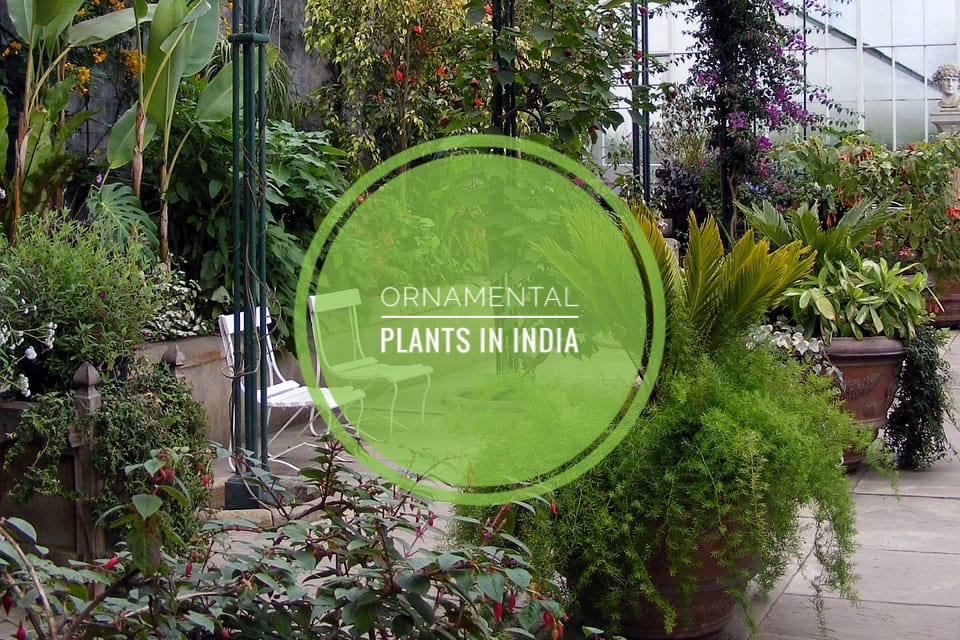Most of us start gardening to add a little life to our homes. A bright flower near the window, a leafy corner in the balcony, or a cluster of green on the terrace instantly makes a space feel peaceful. That’s the magic of ornamental plants in India.
These plants are not just about beauty. They bring freshness, improve air quality, and make even the smallest homes look vibrant. Whether it’s a flowering hibiscus, a lush money plant, or a neat border of crotons, every ornamental plant has its charm.
WHAT ARE ORNAMENTAL PLANTS?
Ornamental plants are grown mainly for their decorative value. Unlike vegetables or fruit trees, they are not planted for food but for their appearance — flowers, leaves or overall shape.
They include flowering plants, foliage plants, shrubs, climbers, indoor species, and even small trees. These plants can grow in pots, hanging baskets, or garden beds, depending on your space.

Here’s a quick comparison of ornamental plant types and examples:
| Type | Examples | Special Feature |
|---|---|---|
| Flowering Plants | Hibiscus, Marigold, Bougainvillea | Bright colors and seasonal blooms |
| Foliage Plants | Croton, Fern, Calathea | Attractive leaf colors and patterns |
| Indoor Plants | Peace Lily, Areca Palm, Money Plant | Thrive in low light and purify air |
| Shrubs | Ixora, Gardenia, Ficus | Compact and suitable for hedges or pots |
| Climbers | Jasmine, Morning Glory | Add vertical beauty to walls or trellises |
BENEFITS OF ORNAMENTAL PLANTS
Ornamental plants offer more than just beauty. They have physical, emotional, and environmental benefits that make them ideal for modern Indian homes.
1. Enhance Aesthetic Appeal
They add color, texture, and structure to any space. A few pots on a balcony or along a boundary wall can completely transform a dull corner into something lively.
2. Improve Air Quality
Many ornamental plants, like Areca Palm and Peace Lily, help remove toxins from indoor air. NASA’s clean air study even highlighted several houseplants for their filtering ability.
3. Reduce Stress and Improve Mood
Caring for plants is known to calm the mind. Watching leaves grow or flowers bloom can lower stress and anxiety levels.
4. Attract Pollinators
Flowering ornamentals like hibiscus, zinnia, and jasmine attract bees and butterflies. This helps with pollination in nearby fruit or vegetable plants too.
5. Boost Property Value
A well-kept garden or a row of ornamental plants makes any home look more welcoming and can even increase its market appeal.

POPULAR ORNAMENTAL PLANTS IN INDIA
India’s diverse climate supports a wide range of ornamental plants, from tropical flowering species to low-light indoor ones. Below are 25 beautiful options, grouped by type, that are easy to grow and perfect for home gardens.
1. FLOWERING ORNAMENTALS
1. Hibiscus (Gudhal)
- Native: Asia
- Flower Color: Red, pink, yellow, orange
- Climate: Warm and humid
Hibiscus blooms almost all year and loves sunlight. It’s great for balconies and garden borders.
2. Bougainvillea
- Native: South America
- Flower Color: Magenta, orange, white, purple
- Climate: Hot and dry
A sun-loving plant perfect for walls, fences, and terraces. Needs minimal watering.
3. Marigold (Genda)
- Native: Mexico
- Flower Color: Orange, yellow
- Climate: Tropical and subtropical
A fast-blooming seasonal favorite that adds instant color to gardens and attracts pollinators.
4. Jasmine (Mogra)
- Native: South Asia
- Flower Color: White
- Climate: Warm and humid
A fragrant climber or shrub ideal for pots and fences. Blooms heavily in summer.
5. Zinnia
- Native: Central America
- Flower Color: Pink, red, orange, yellow
- Climate: Warm and sunny
Zinnias are bright, low-maintenance flowers that grow well in containers and open beds.

2. FOLIAGE ORNAMENTALS
1. Croton (Codiaeum variegatum)
- Leaf Colors: Green, red, yellow, orange
- Light: Bright indirect
A colorful foliage plant that thrives outdoors in bright light or on sunny balconies.
2. Ferns
- Leaf Type: Soft fronds
- Light: Indirect or filtered
Perfect for shady areas. They need frequent misting and moisture.
3. Calathea
- Leaf Pattern: Variegated stripes
- Light: Low to medium
Ideal for indoor corners, known for beautiful patterned leaves.
4. Coleus (Painted Nettle)
- Leaf Colors: Purple, green, pink
- Light: Partial shade
An easy-to-grow plant with striking leaves. Grows well in pots or garden borders.
5. Dieffenbachia (Leopard Lily)
- Leaf Pattern: Cream and green
- Light: Bright indirect
Popular indoor foliage plant. Avoid placing within reach of pets or small children.

3. INDOOR ORNAMENTALS
1. Areca Palm
- Feature: Air purifying
- Light: Indirect sunlight
- Water: Twice a week
A tall, graceful palm ideal for living rooms and shaded patios.
2. Money Plant (Pothos)
- Feature: Fast-growing vine
- Light: Low to bright indirect
- Water: Moderate
Grows easily in water or soil, bringing freshness and positive energy indoors.
3. Peace Lily
- Feature: White flowers, air purifier
- Light: Low light
- Water: Weekly
Tolerates indoor light well and looks elegant in corners or tabletops.
4. Snake Plant (Sansevieria)
- Feature: Hardy and drought-tolerant
- Light: Low to bright
- Water: Once in 10 days
Excellent for beginners; filters air and grows well in all conditions.
5. Spider Plant (Chlorophytum comosum)
- Feature: Easy to grow, hanging type
- Light: Bright indirect
- Water: Twice a week
Produces small baby plants that can be replanted easily.

4. SHRUBS AND SMALL TREES
1. Ixora
- Flower Colors: Red, pink, orange
- Light: Full sun
Compact and bushy shrub ideal for hedges and pots.
2. Ficus Benjamina (Weeping Fig)
- Feature: Glossy green leaves
- Light: Bright indirect
Common indoor ornamental shrub with neat, dense foliage.
3. Plumeria (Champa)
- Feature: Fragrant tropical flowers
- Light: Full sun
A small tree that adds a tropical look to home gardens.
4. Gardenia (Cape Jasmine)
- Feature: White, fragrant flowers
- Light: Bright filtered
Needs humidity and care but rewards with sweet-smelling blooms.
5. Oleander (Kaner)
- Feature: Long-blooming shrub
- Flower Colors: White, pink, red
Tolerates heat and dry conditions, perfect for sunny terraces.
5. CLIMBING ORNAMENTALS
1. Morning Glory (Ipomoea)
- Flower Colors: Blue, purple, pink
- Light: Full sun
Fast-growing climber that covers fences beautifully.
2. Madhumalti (Rangoon Creeper)
- Feature: Fragrant flowers
- Color: Red to pink shades
- Light: Full sunlight
Blooms in clusters and attracts butterflies.
3. English Ivy
- Feature: Evergreen climber
- Light: Partial shade
Excellent for hanging baskets or wall covers, especially in cooler areas.
4. Clitoria (Aparajita)
- Feature: Blue flowers
- Light: Full sun
A hardy Indian native often used in home gardens for its unique blooms.
5. Sweet Pea (Lathyrus odoratus)
- Feature: Fragrant flowers
- Light: Full sun, mild climate
Best for trellises or fences in cooler months.
These 25 ornamental plants offer variety in color, texture and purpose — from flowering borders to lush indoor greens. With the right mix of sunlight and care, they can brighten any corner of your home.

HOW TO CARE FOR ORNAMENTAL PLANTS
You don’t need to be an expert to keep ornamentals healthy. Just a few habits make a big difference.
1. Soil
Most ornamentals prefer well-draining soil. Mix garden soil with compost and sand to improve texture.
2. Watering
Avoid overwatering. Check the top layer of soil — if it’s dry, water the plant. Indoor species like money plant need less frequent watering.
3. Sunlight
Flowering plants usually need 4 to 6 hours of direct sunlight. Foliage and indoor plants prefer shade or filtered light.
4. Fertilizer
Feed once every month using organic compost or liquid fertilizer. Too much fertilizer can burn roots, so stay light-handed.
5. Pruning
Regular trimming keeps the plant in shape and encourages new growth. Remove dry leaves and spent flowers.
6. Pest Control
Common pests like aphids or mealybugs can be managed with neem oil spray. Keep the leaves clean and dry.

LANDSCAPING AND DECOR IDEAS FOR SMALL HOMES
Even with limited space, you can design a charming ornamental setup. Here’s how:
- Balcony Garden: Use hanging pots for money plant and wall climbers like jasmine. Place crotons or palms on the floor corners.
- Window Ledge: Keep small flowering pots of marigold or petunia. They add instant cheer.
- Indoor Corners: Use large indoor ornamentals like Areca Palm or Ficus in decorative pots.
- Vertical Garden: Install a frame and grow foliage plants like philodendron or ferns.
- Entrance Area: Line the walkway with flowering shrubs like ixora or hibiscus.
A mix of flowering and foliage plants gives depth and color balance to your home garden.
FAQ ABOUT ORNAMENTAL PLANTS IN INDIA
1. Are all ornamental plants flowering?
No. Ornamental plants include flowering, foliage, and even indoor species. Any plant that adds visual beauty — through flowers, leaves, or shape — is considered ornamental.
2. Which ornamental plants are best for small balconies?
For small spaces, try money plant, peace lily, croton, or hibiscus in pots. These plants grow well in containers and bring color without crowding the area.
3. Do ornamental plants need fertilizer every week?
Not at all. Most ornamentals do well with compost or organic fertilizer once every 3 to 4 weeks during their growing season.
4. Can ornamental plants survive indoors without sunlight?
Some can. Plants like snake plant, peace lily, and pothos manage with minimal light. Still, they need a few hours of bright shade for healthy growth.
5. Are ornamental plants safe for pets?
A few ornamental plants, like dieffenbachia and peace lily, can irritate pets if chewed. Always check plant safety before placing them where pets can reach.

Ornamental plants bring life and color to our homes. They are simple to grow, need moderate care, and suit every space from balconies to living rooms.
By understanding their needs and choosing the right mix, we can enjoy a greener home that looks beautiful and feels refreshing every day.
Thanks for reading. Keep growing, keep exploring, and don’t forget to return here at gardeningbud.com for more plants, tips and gardening wisdom.”
